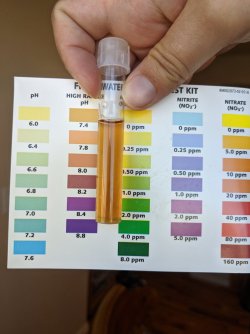PearlTigress
New Member
Hello,
I'm purchasing a complete tank off of Craigslist, fish and all. It's listed as a 60g but the dimensions are for a 75g (4ftx13inx28in). It has two Oscars, about 9" each, and one female convict cichlid, about 3-4". I know the Oscars can get larger, and I'm worried about the convict being alone. What do you think I should do? Leave everyone as they are, re-home the Convict, get more convicts...? I've never had aggressive cichlids before so I'm coming to the experts!
I'm excited about this purchase because for $200 I'm getting the tank, stand, canister filter, food, light, decor, everything. Also, is there anything that would be a good addition to the tank at this point? I know it can't be anything even a little bit small! Let me know. And I'm taking name ideas for these beauties as well. (-; Thanks for taking time to read this.

I'm purchasing a complete tank off of Craigslist, fish and all. It's listed as a 60g but the dimensions are for a 75g (4ftx13inx28in). It has two Oscars, about 9" each, and one female convict cichlid, about 3-4". I know the Oscars can get larger, and I'm worried about the convict being alone. What do you think I should do? Leave everyone as they are, re-home the Convict, get more convicts...? I've never had aggressive cichlids before so I'm coming to the experts!
I'm excited about this purchase because for $200 I'm getting the tank, stand, canister filter, food, light, decor, everything. Also, is there anything that would be a good addition to the tank at this point? I know it can't be anything even a little bit small! Let me know. And I'm taking name ideas for these beauties as well. (-; Thanks for taking time to read this.


